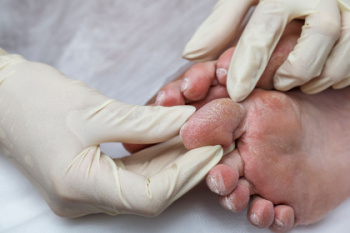Glen Allen Office
(804) 747-3380

Diabetic foot complications are serious concerns that can greatly affect quality of life if not properly managed. One major issue is neuropathy, where damaged nerves lead to a loss of sensation in the feet, making it difficult to detect injuries. Poor circulation is another common problem, limiting the blood flow needed for healing and increasing the risk of infections. Skin changes, such as dryness and cracking, create openings for bacteria to enter, further raising the chance of complications. Ulcers may develop on pressure points and can become deep wounds that are slow to heal. Additionally, infections are a major risk and can quickly spread if untreated. If you have diabetes, it is suggested that you are under the care of a podiatrist who can help you to manage this serious condition as it affects your feet.
Diabetic foot care is important in preventing foot ailments such as ulcers. If you are suffering from diabetes or have any other concerns about your feet, contact one of our podiatrists from The Podiatry Center. Our doctors can provide the care you need to keep you pain-free and on your feet.
Diabetic Foot Care
Diabetes affects millions of people every year. The condition can damage blood vessels in many parts of the body, especially the feet. Because of this, taking care of your feet is essential if you have diabetes, and having a podiatrist help monitor your foot health is highly recommended.
The Importance of Caring for Your Feet
Patients with diabetes should have their doctor monitor their blood levels, as blood sugar levels play such a huge role in diabetic care. Monitoring these levels on a regular basis is highly advised.
It is always best to inform your healthcare professional of any concerns you may have regarding your feet, especially for diabetic patients. Early treatment and routine foot examinations are keys to maintaining proper health, especially because severe complications can arise if proper treatment is not applied.
If you have any questions please feel free to contact one of our offices located in Richmond and Glen Allen, VA . We offer the newest diagnostic and treatment technologies for all your foot and ankle needs.